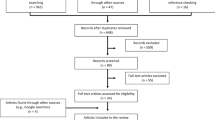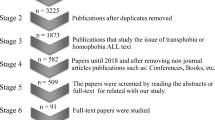Abstract
Objectives
Despite the precarious and unsafe working conditions frequently experienced by sex workers (SWs) and im/migrant workers, there remains a paucity of research on work-related stress and links to duration of im/migration residency among SWs. This study analyzes the relationship between duration of residency and two dimensions of work stress among SWs in Metro Vancouver.
Methods
Data were drawn from a longitudinal cohort of women SWs across Metro Vancouver (2010–2014). Multivariable confounder models with generalized estimating equations were developed to examine the independent effects of duration of residency on decision authority and job demands, after adjusting for confounders.
Results
Of 545 SWs, 9.7% were recent im/migrants, 13.9% were long-term im/migrants, and 76.2% were non-migrants. In comparison to non-migrant SWs, recent (β coefficient − 1.02, 95% CI − 1.57 to − 0.47) and long-term im/migrants (β coefficient − 0.87, 95% CI − 1.36 to −0.38) faced decreased work stress related to job demands after adjustment for key confounders. Decision authority did not retain a significant independent association after adjusting for the same factors.
Conclusion
Job demands varied significantly by duration of residency. This may be explained by changing working conditions and experiences over the course of arrival and settlement among im/migrant SWs, as well as the role of formal work environments in supporting im/migrant SWs’ well-being. Given high rates of work stress related to job demands and low decision authority among all SWs, decriminalization of sex work, improved occupational standards, and culturally sensitive interventions to promote collectivization and improved access to working conditions remain needed.
Résumé
Objectifs
Malgré les conditions de travail souvent précaires et dangereuses des travailleuses et des travailleurs du sexe (TS) ainsi que des travailleuses et des travailleurs migrants ou immigrés, il n’y a toujours pas suffisamment de recherche sur le stress au travail et ses liens avec la durée de la période de résidence chez les TS migrants ou immigrés. Notre étude porte sur la relation entre la durée de résidence et deux aspects du stress au travail chez les TS du Grand Vancouver.
Méthode
Nos données proviennent d’une cohorte longitudinale de travailleuses du sexe du Grand Vancouver (2010–2014). Nous avons créé des modèles d’analyse multivariée des facteurs confusionnels avec des équations d’estimation généralisées pour examiner les effets indépendants de la durée de résidence sur le pouvoir de décision et les exigences de l’emploi, après ajustement en fonction des facteurs confusionnels.
Résultats
Sur 545 TS, 9,7 % avaient migré ou immigré récemment, 13,9 % étaient migrantes ou immigrées de longue date, et 76,2 % n’étaient ni migrantes, ni immigrées. Par comparaison avec les TS non migrantes, les TS ayant migré ou immigré récemment (coefficient β – 1,02, IC de 95 % − 1,57 à – 0,47) et celles ayant migré ou immigré depuis plus longtemps (coefficient β – 0,87, IC de 95 % − 1,36 à – 0,38) éprouvaient moins de stress au travail lié aux exigences de l’emploi compte tenu des principaux facteurs confusionnels. Le pouvoir de décision n’était plus indépendamment associé au stress après ajustement pour tenir compte des mêmes facteurs.
Conclusion
Les exigences de l’emploi variaient sensiblement selon la durée de résidence. Cela peut s’expliquer par l’évolution des conditions de travail et des expériences vécues par les TS migrantes ou immigrées à leur arrivée et au cours de leur établissement, ainsi que par le rôle des milieux de travail structurés pour favoriser le bien-être des TS migrantes ou immigrées. Étant donné les niveaux élevés de stress au travail liés aux exigences de l’emploi et au faible pouvoir de décision chez toutes les TS, il demeure nécessaire de décriminaliser le travail du sexe, d’améliorer les normes de travail et de mener des interventions culturellement appropriées pour favoriser la collectivisation et améliorer l’accès à de bonnes conditions de travail.
Similar content being viewed by others
References
Anderson, S., Jia, J. X., Liu, V., et al. (2015). Violence prevention and municipal licensing of indoor sex work venues in the Greater Vancouver Area: narratives of migrant sex workers, managers and business owners. Culture, Health & Sexuality, 17(7), 825–841.
Benach, J., Muntaner, C., Delclos, C., et al. (2011). Migration and ‘low-skilled’ workers in destination countries. PLoS Medicine, 8(6), e1001043.
Canadian Alliance for Sex Work Law Reform. (2015). Criminalizing of the purchase of sex: impacts and consequences. Available at: http://www.gshi.cfenet.ubc.ca/sites/default/files/Criminalizing-Purchase.pdf. Accessed January 26, 2016.
Duff, P., Sou, J., Chapman, J., et al. (2017). Poor working conditions and work stress among Canadian sex workers. Occupational Medicine (Oxford, England), 67(7), 515–521.
el-Bassel, N., Schilling, R. F., Irwin, K. L., et al. (1997). Sex trading and psychological distress among women recruited from the streets of Harlem. American Journal of Public Health, 87(1), 66–70.
Goldenberg, S. M., Liu, V., Nguyen, P., et al. (2014). International migration from non-endemic settings as a protective factor for HIV/STI risk among female sex workers in Vancouver, Canada. Journal of Immigrant and Minority Health, 17(1), 21–28.
Goldenberg, S. M., Duff, P., & Krusi, A. (2015). Work environments and HIV prevention: a qualitative review and meta-synthesis of sex worker narratives. BMC Public Health, 15(1) http://www.biomedcentral.com/1471-2458/15/1241. Accessed December 18, 2015.
Goldenberg, S. M., Krüsi, A., Zhang, E., et al. (2017). Structural determinants of health among im/migrants in the indoor sex industry: experiences of workers and managers/owners in metropolitan Vancouver. PLoS One, 12(1), e0170642.
Government of Canada. Canadian Community Health Survey (CCHS) - 2016. (2015). Available at: http://www23.statcan.gc.ca/imdb/p3Instr.pl?Function=assembleInstr&a=1&&lang=en&Item_Id=260675#qb270126. Accessed May 18, 2018.
Karasek, R., Brisson, C., Kawakami, N., et al. (1998). The Job Content Questionnaire (JCQ): an instrument for internationally comparative assessments of psychosocial job characteristics. Journal of Occupational Health Psychology, 3(4), 322–355.
Krüsi, A., Chettiar, J., Ridgway, A., et al. (2012). Negotiating safety and sexual risk reduction with clients in unsanctioned safer indoor sex work environments: a qualitative study. American Journal of Public Health, 102(6), 1154–1159.
Krusi, A., Pacey, K., Bird, L., et al. (2014). Criminalisation of clients: reproducing vulnerabilities for violence and poor health among street-based sex workers in Canada--a qualitative study. BMJ Open, 4(6), e005191–e005191.
Krüsi, A., Kerr, T., Taylor, C., et al. (2016). ‘They won’t change it back in their heads that we’re trash’: the intersection of sex work-related stigma and evolving policing strategies. Sociology of Health & Illness, 38(7), 1137–1150.
Maldonado, G., & Greenland, S. (1993). Simulation study of confounder-selection strategies. American Journal of Epidemiology, 138(11), 923–936.
Man, G. (2004). Gender, work and migration: deskilling Chinese immigrant women in Canada. Women's Studies International Forum, 27(2), 135–148.
McDowell, I. (2006). Measuring health: A guide to rating scales and questionnaires. New York: Oxford University Press.
Menéndez, M., Benach, J., Muntaner, C., et al. (2007). Is precarious employment more damaging to women’s health than men’s? Social Science & Medicine (1982), 64(4), 776–781.
Platt, L., Grenfell, P., Fletcher, A., et al. (2013). Systematic review examining differences in HIV, sexually transmitted infections and health-related harms between migrant and non-migrant female sex workers. Sexually Transmitted Infections, 89(4), 311–319.
Rekart, M. L. (2005). Sex-work harm reduction. Lancet, 366(9503), 2123–2134.
Ross, M. W., Crisp, B. R., Månsson, S.-A., et al. (2012). Occupational health and safety among commercial sex workers. Scandinavian Journal of Work, Environment & Health, 38(2), 105–119.
Sanders, T., & Hardy, K. (2012). Devalued, deskilled and diversified: explaining the proliferation of the strip industry in the UK. The British Journal of Sociology, 63(3), 513–532.
Sanders, D. T., & Hardy, D. K. (2013). Sex work: the ultimate precarious labour? Criminal Justice Matters, 93(1), 16–17.
Shannon, K., Bright, V., Allinott, S., et al. (2007). Community-based HIV prevention research among substance-using women in survival sex work: the Maka Project Partnership. Harm Reduction Journal, 4, 20.
Shannon, K., Strathdee, S. A., Goldenberg, S. M., et al. (2014). Global epidemiology of HIV among female sex workers: influence of structural determinants. The Lancet. Available at: http://linkinghub.elsevier.com/retrieve/pii/S0140673614609314. Accessed July 22, 2014.
Sou, J. B., Shannon, K., Li, J., et al. (2015). Structural determinants of inconsistent condom use with clients among migrant sex workers: findings of longitudinal research in an urban Canadian setting. Sexually Transmitted Diseases, 42(6), 312–316.
Tompa, E., Scott-Marshall, H., Dolinschi, R., et al. (2007). Precarious employment experiences and their health consequences: towards a theoretical framework. Work (Reading, Mass.), 28(3), 209–224.
Vanwesenbeeck, I. (2005). Burnout among female indoor sex workers. Archives of Sexual Behavior, 34(6), 627–639.
Wang, J. L. (2006). Perceived work stress, imbalance between work and family/personal lives, and mental disorders. Social Psychiatry and Psychiatric Epidemiology, 41(7), 541–548.
Yuen, W. W.-Y., Wong, W. C.-W., Holroyd, E., et al. (2014). Resilience in work-related stress among female sex workers in Hong Kong. Qualitative Health Research, 24(9), 1232–1241. https://doi.org/10.1177/1049732314544968.
Zimmerman, C., Kiss, L., & Hossain, M. (2011). Migration and health: a framework for 21st century policy-making. PLoS Medicine, 8(5), e1001034.
Acknowledgements
We thank all those who contributed their time and expertise to this project, particularly participants, AESHA community advisory board members, and partner agencies. We wish to acknowledge Chrissy Taylor, Jill Chettiar, Jennifer Morris, Tina Ok, Avery Alder, Emily Groundwater, Jane Li, Sylvia Machat, Lauren Martin McCraw, Minshu Mo, Chris Rzepa, Brittany Udall, Rachel Nicoletti, Emily Sarah Leake, Rachel Croy, Zannie Biggs, Natalie Blair, Emily Sollows, Melissa Braschel, Sabina Dobrer, Krista Butler, Sarah Allan, and Peter Vann for their research and administrative support.
Funding
This research was supported by operating grants from the US National Institutes of Health (R01DA028648) and Canadian Institutes of Health Research (HHP-98835), the Canadian Institutes of Health Research/Public Health Agency of Canada (HEB-330155), and MacAIDS. KS holds a Canada Research Chair in Global Sexual Health and HIV/AIDS and a Scholar Award from the Michael Smith Foundation for Health Research. SG is supported by a Canadian Institutes of Health Research New Investigator Award and the National Institutes of Health (R01DA028648).
Author information
Authors and Affiliations
Corresponding author
Ethics declarations
Conflict of interest
The authors declare that they have no conflict of interest.
Research involving human participants
All procedures performed in studies involving human participants were in accordance with the ethical standards of the institution or practice at which the studies were conducted (Providence Health Care/University of British Columbia Ethics Board).
Informed consent
Informed consent was obtained from all individual participants included in the study.
Additional information
Publisher’s Note
Springer Nature remains neutral with regard to jurisdictional claims in published maps and institutional affiliations.
Rights and permissions
About this article
Cite this article
Sou, J., Shannon, K., Shoveller, J. et al. Impacts of im/migration experience on work stress among sex workers in Vancouver, Canada. Can J Public Health 110, 344–353 (2019). https://doi.org/10.17269/s41997-018-0161-3
Received:
Accepted:
Published:
Issue Date:
DOI: https://doi.org/10.17269/s41997-018-0161-3




